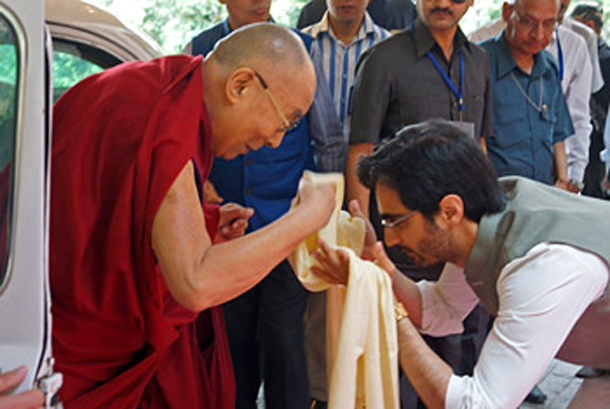 Dehradun, India – Speaking to audiences from different parts of the world at the Vana Retreat Centre in Dehradun Wednesday, His Holiness the Dalai Lama said Violence always brings suffering and yet no one wants suffering.
Dehradun, India – Speaking to audiences from different parts of the world at the Vana Retreat Centre in Dehradun Wednesday, His Holiness the Dalai Lama said Violence always brings suffering and yet no one wants suffering.
The spiritual leader of Tibet arrived in Dehradun, Uttarakhand State in the northern part of India, on Wednesday morning, April 6, to grace the Vana Retreat Centre. He was welcomed by Tibetans lining the road waiting to greet him on his way to the wellness retreat.
450 people gathered from many different parts of the world awaited in the center's main building to listen to His Holiness, who focused his address to the audience on cultivating peace in our world today.
"During almost the whole of my life, I've been witness to killing and violence. When I was born the Sino-Japanese conflict was about to break out and the conditions that gave rise to the Second World War were stirring in Europe. After that came the Korean War and the Vietnam War. Throughout this period, many people suffered and were killed," the Nobel peace prize winner stressed.
"Here and now we're living in peace and comfort, but at the same time in other places many people are dying as a result of anger and other negative emotions. If things continue this way, the 21st century will end up being as violent as the century that went before. Violence always brings suffering and yet no one wants suffering, we all want to live in peace."
His Holiness continued, "although our basic nature is to be kind, affectionate and compassionate towards others, and we tend to be like that as children, we seem to lose these qualities as we grow up. We no longer feel the need to care about others, exploiting them, bullying them and lying to them instead. We become inured to others' suffering so that if a tiger kills someone it's news, but when there are reports of people killing each other, we are almost indifferent to them."
Suggesting that we could counter this by altering our modern education system, he explained that if we began with inner values rather than materialistic goals, we could help to cultivate our compassionate nature, then leading to a peaceful life.
"I believe that thinking only of your own comfort and peace to the neglect of other troubles in the world is immoral. The time has come for us to consider seriously how to change our way of life, not through prayer or religious teaching, but through education. Since moral education can sometimes be merely superficial, we need to devise a systematic approach to exploring inner values and ways to create a more peaceful world," he said.
His Holiness added: "This involves thinking about the future and although I will not live to see the happier world that may come about, if those young people who belong to the 21st century generation make the effort they may create a happier world and ensure that this century is a more peaceful era."
"Many of the problems we face we create ourselves as a result of short-sightedness and narrow-mindedness. This amounts to ignorance and we have to overcome it. Those of us who belong the old generation who created so many of these problems have a responsibility to indicate what's wrong and how we may achieve a happier humanity," the Tibetan leader said.
He said that "this is my first commitment; the second relates to my being a Buddhist monk and my interest in promoting religious harmony. India, the world's more populous democracy has shown over hundreds of years that different religious traditions can live in harmony, side by side. One vivid example is the way Guru Nanak, the founder of Sikhism, came from a Hindu background but went on pilgrimage to Mecca to demonstrate his respect for diversity. India's example is something the world could learn from."
His Holiness then fielded questions from the audience on a variety of topics including compassion, death, anger, and other subjects. Afterwards, he ate lunch with the other guests and a tour of the premises, including a Tibetan Healing Center that has recently been incorporated. His Holiness then thanked his host and the audience, and returned to New Delhi.


![Tibet has a rich history as a sovereign nation until the 1950s when it was invaded by China. [Photo: File]](/images/stories/Pics-2024/March/Tibet-Nation-1940s.jpg#joomlaImage://local-images/stories/Pics-2024/March/Tibet-Nation-1940s.jpg?width=1489&height=878)















